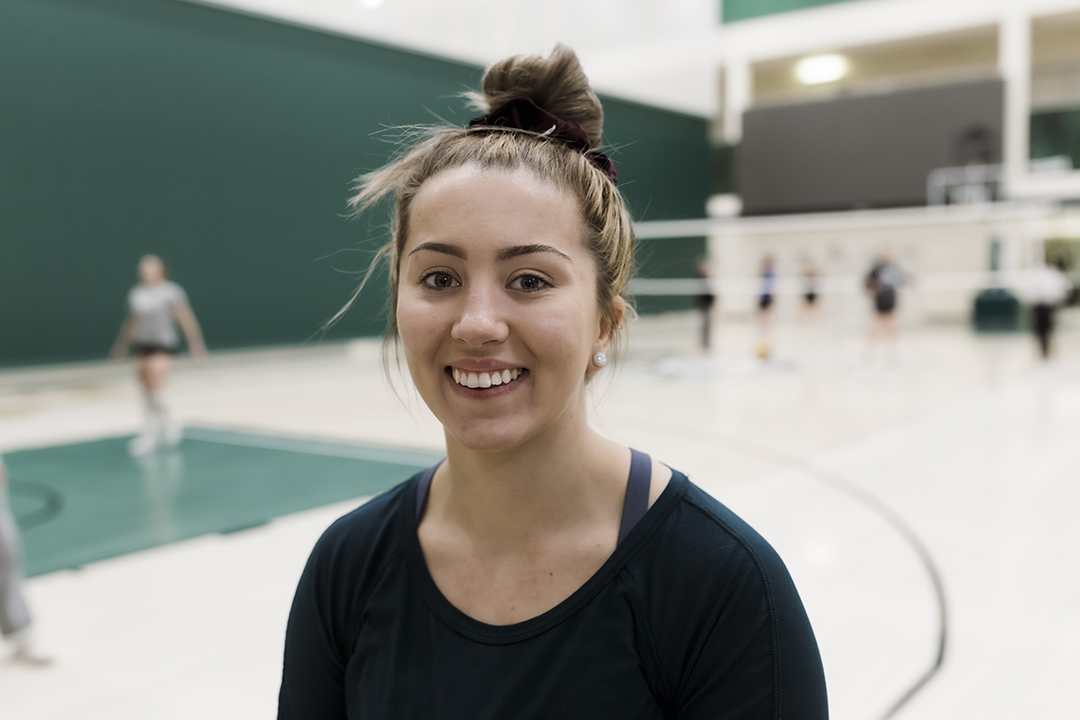
Family recovery inspires USask student
When Kaili Gilroy’s aunt suffered a traumatic brain injury, the recovery process she witnessed first-hand gave her insight into her future career.
By Ashley Sharp and John ShellingGilroy, a member of Manitoba Métis Federation, is in her second year in the School of Rehabilitation Science (SRS) in the College of Medicine. After graduation she plans to return to her home in Swan River to help serve the health care needs of her community.
Gilroy will receive an award for community engagement at this year’s Indigenous Student Achievement Awards on Feb. 6. Indigenous students from across USask will be honoured at a ceremony to recognize their academic excellence, leadership, research endeavours or community engagement.
The award ceremony is part of Indigenous Achievement Week (IAW), which celebrates the successes and contributions of Métis, First Nations and Inuit students, staff and faculty. The festivities include a public art project, speakers and celebrations in various locations across campus.
We asked Gilroy a few questions about her time at USask and what motivates her.
What drew you to the School of Rehabilitation Science?
Early on in high school I knew I wanted to pursue a career in physical therapy, specifically within private practice. I was very involved in sports, and like many young athletes, I would get injured. Experiencing physical therapy firsthand for my own injuries was very intriguing to me and I knew one day I wanted to work in a clinic and treat musculoskeletal injuries one day.
While pursuing my Bachelor of Kinesiology at the University of Regina, I always had the SRS's Masters of Physical Therapy program at the back of my mind. When researching physical therapy schools across Canada, what drew me to the SRS was the musculoskeletal curriculum. The manual therapy skills that new SRS graduates possess are what set us aside from other schools, and with my mind set on private practice, I knew this would be a perfect fit.
You are working with the USask Huskies for your practicum, what's the most important thing you've learned working with student athletes?
Although I have only been on my clinical placement with Huskie Athletics for two weeks, I have quickly learned how exciting it is to work with this population. The athletes I have had the opportunity to work with are all incredibly ambitious and self-disciplined. Being able to assess and treat these individuals is a great pleasure as I know they all take their rehabilitation program seriously. When providing exercises or stretches, I am confident that they will follow through as their ability to perform is on the line. Being able to treat the athletes and then watch their games or matches on weekends is a very unique experience, and I am very much looking forward to the next three weeks with Huskie Athletics.
How has coming from a small community affected your perspective on community involvement?
Growing up in rural Manitoba, community involvement is vital to create and sustain the benefits we come to expect and enjoy. Volunteering is second nature to those who prefer a small community lifestyle. Without volunteers, a small town will not thrive. The lack of resources in rural communities forces and encourages people to work together and help one another.
Whether it be a fundraiser for the local Aboriginal Headstart Program, a family dealing with the medical needs of a child, or a community event, everyone always seems to come together to achieve the end goal. Upon graduation, I look forward to returning home to Swan River, MB, as a way to help pay back my dues. I am very much looking forward to proudly serving the community in any way I can.
Has there been someone in your life who has inspired you to get to where you are today?
In 2012, my aunt suffered a traumatic brain injury and was in coma for three weeks before beginning her journey to recovery. While being treated at the Health Sciences Centre in Winnipeg, MB, she went through extensive speech-language therapy, occupational therapy, and physical therapy. Fortunately, with the help of her medical team and therapists, she was able to make a near-full recovery.
With my strong interest in physical therapy, I thought it would be a great learning experience to observe one of my aunt's physical therapy sessions. The physical therapists that were working with her at the time were extremely knowledgeable, compassionate, and encouraging. Being able to see the progress my aunt made was very inspiring and it opened my eyes to the importance of this profession. The impact of physical therapy on her recovery was significant, and whether I work in a public or private setting, I hope to be as instrumental in my future patient’s lives as those therapists were for my aunt.
This year's Indigenous Achievement Week theme is Indigenous knowledge systems. How can Indigenous knowledge systems improve the world we live in?
As a future healthcare provider, the ultimate goal is to help improve the health of individuals. Health, according to the World Health Organization, is defined as "the state of complete physical, mental, and social well-being and not merely the absence of disease." In order to uphold this value with the Indigenous population, healthcare providers should be cognizant of their traditional medicinal practices. However, without having traditional knowledge passed on to future generations, these practices could become lost very quickly. By educating future generations and healthcare providers, I believe that traditional medicinal practices could become more prevalent and ultimately improve the health of the Indigenous population.

